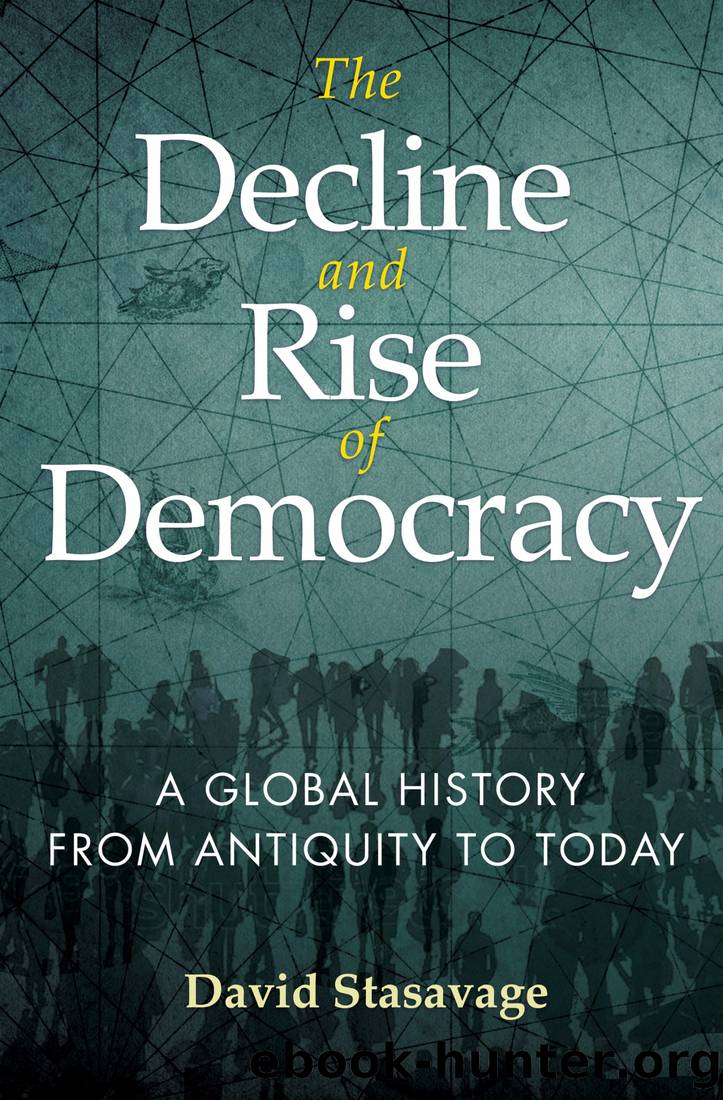The Decline and Rise of Democracy: A Global History from Antiquity to Today by David Stasavage

Author:David Stasavage
Language: eng
Format: azw3
Publisher: Princeton University Press
Published: 2020-04-15T00:00:00+00:00
Massachusetts
In the case of Massachusetts, after a few decades, settlements were dispersed across a wide territory, making the exercise of hierarchical control from Boston difficult if not impossible. Nothing resembling a state with coercive power existed, and the legacy of this was apparent even as late as Alexis de Tocqueville’s visit to America in the 1830s. He remarked that in New England, towns and their assemblies had preceded the construction of a state.6 In the absence of a state, the only alternative, as we have seen in so many other societies, was to rule by consent, in this case through what would become known as the New England town meeting. As one historian put it, “The town meeting solved the problem of enforcement by evading it.”7 Without coercive institutions or a bureaucracy, it was logical that all should have the right to vote in order to build consensus.
The Massachusetts Body of Liberties of 1641 established a broad manhood suffrage along the following lines: “The Freemen of every Towneship shall have the power to make such by laws and constitutions as may concerne the welfare of their Townes.”8 In addition it was specified that “It is the constant libertie of the freemen of this plantation to choose yearly at the Court of Election out of the freemen all the general officers of this Jurisdiction.”9
What we have here is an extraordinary statement about a broad suffrage. It cannot be said to have derived from Puritan ideology because the Puritan leaders themselves did not support it. In the 1630s John Winthrop had argued against a greater role for elections to the General Court, the assembly of the Massachusetts Bay Colony. To bolster his case Winthrop invited John Cotton, a prominent minister, to give a sermon to the General Court where he preached against the dangers of excess democracy.10 Puritan ministers favored a suffrage restricted to members of their church and a deferential relationship between governor and governed equivalent to what they saw as appropriate between man and wife.11 Nor can it be said to derive simply from English ideas or practice. In 1641 the Levellers had not yet pronounced in favor of a broad suffrage, and they were ultimately unsuccessful in achieving that goal.
The General Court first met in 1634. Initially, the idea was that all free men should attend, but the onerous nature of this task quickly resulted in a system of representation with individual towns or plantations selecting representatives.12 These representatives were selected by a broad franchise. In 1691, when the Province of Massachusetts Bay was established, the qualifications for the suffrage were set at either holding land that would rent for forty shillings a year or holding forty pounds sterling of property. This was a clear imitation of English practice, but while the forty-shilling rule was a very significant restriction of the franchise in England, in the North American context of broad landownership, this was much less so. Scholars generally assume that most free men retained the right to vote, and there is concrete evidence to back this up.
Download
This site does not store any files on its server. We only index and link to content provided by other sites. Please contact the content providers to delete copyright contents if any and email us, we'll remove relevant links or contents immediately.
| Arms Control | Diplomacy |
| Security | Trades & Tariffs |
| Treaties | African |
| Asian | Australian & Oceanian |
| Canadian | Caribbean & Latin American |
| European | Middle Eastern |
| Russian & Former Soviet Union |
The Secret History by Donna Tartt(16608)
The Social Justice Warrior Handbook by Lisa De Pasquale(11485)
Thirteen Reasons Why by Jay Asher(7782)
This Is How You Lose Her by Junot Diaz(5753)
Weapons of Math Destruction by Cathy O'Neil(5029)
Zero to One by Peter Thiel(4816)
The Myth of the Strong Leader by Archie Brown(4785)
Promise Me, Dad by Joe Biden(4440)
Stone's Rules by Roger Stone(4412)
Beartown by Fredrik Backman(4403)
How Democracies Die by Steven Levitsky & Daniel Ziblatt(4392)
The Fire Next Time by James Baldwin(4336)
100 Deadly Skills by Clint Emerson(4070)
A Higher Loyalty: Truth, Lies, and Leadership by James Comey(4024)
Rise and Kill First by Ronen Bergman(4008)
The David Icke Guide to the Global Conspiracy (and how to end it) by David Icke(3875)
The Farm by Tom Rob Smith(3869)
Secrecy World by Jake Bernstein(3773)
The Doomsday Machine by Daniel Ellsberg(3725)
